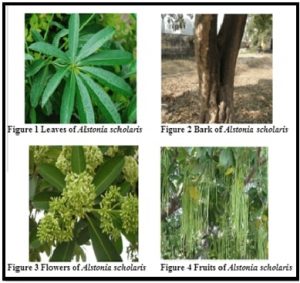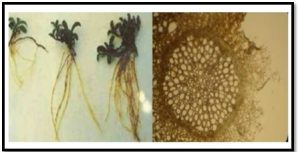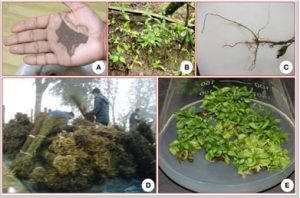Nobody can ignore the fearful situation that has arrived due to the COVID-19 pandemic. Multiple pharmaceutical products are already marketed and some are in pipeline expecting to give us relief from this life-threatening disease. During this pandemic, not only allopathic medicines, but researchers are working in alternative and complementary medicinal systems to find out an effective solution against this deadly virus. People also started taking different traditional medicinal herbal remedies to boost their immunity to get a victory against the COVID-19 attack.
On April 29, 2021, the Union Ministry of AYUSH declared that AYUSH 64, “a poly-herbal formulation developed by the Central Council for Research in Ayurvedic Sciences (CCRAS),” could implicitly aid in the treatment of “asymptomatic, mild and moderate COVID-19 infections as an adjunct to standard care”. [1] Many critics have criticized this decision because they doubt the efficacy of AYUSH 64. They believe no reliable scientific evidence supports the benefit of this formulation against COVID-19. [2] NitaNaturale has taken the initiation to jot down all the scientific journals’ published article details to uncover the possible treatment benefits of herbal ingredients present in AYUSH 64 against COVID-19.
Central Council for Research in Ayurvedic Sciences (CCRAS) in collaboration with the Ministry of AYUSH, Govt. of India has launched a poly-herbal formulation, AYUSH–64 to treat malaria. In 1980, CCRAS has also patented this through National Research Development Corporation after evaluating the safety and efficacy of AYUSH–64 (Patent number 152863). [3, 4]
Clinical Trial details of AYUSH-64
Two human trials had performed to check the efficacy of AYUSH–64 as an anti-malarial drug. Initially, a generalized clinical trial designed had been made to evaluate the anti-malarial efficacy of AYUSH 64. In this study, 1442 positive malaria cases were enrolled at different research institutes and the Center of The Council located in different regions of India. The obtained study result found 89% treatment response that is comparable with Chloroquine and Primaquine (two most commonly used anti-malarial drugs). Later, a double-blind clinical trial was conducted on 178 malaria patients. The study result reported 95.4% drug efficacy. Both of these study findings reported no side effect or toxicity history with the prescribed dose. AYUSH–64 specifically acts against Plasmodium vivax and less efficaciously against Plasmodium falciparum. Plasmodium vivax and Plasmodium falciparum are two common human malaria parasites. [3]
However, another animal research result observed that AYUSH–64 not efficacious against P. berghei, P. yoelii nigeriensis, P. cynomolgi B, and P. knowlesi, four other malaria parasites. [5]
A pilot study had conducted between June 2018 and July 2019 at Raja Ramdeo Anandilal Podar Central Ayurveda Research Institute for Cancer, Mumbai for CCRAS. This trial aimed to evaluate the safety and efficacy of AYUSH 64 in clinically diagnosed Influenza-like illness (ILI). The study author concluded that AYUSH 64 along with standard care was safe and effective against ILI. This formulation also speeds up recovery. Researchers of this study also expected that this poly-herbal formulation might act as an adjuvant therapy with standard care for treating other viral infections that increase body temperature (fever). [6]
Benefits of each of the herbal ingredient present in AYUSH- 64
Composition
Each AYUSH- 64 tablet contains
- Saptaparna(Alstonia scholaris Br.) bark aqueous extract 100 mg
- Katuki(Picrorhiza kurroa Royle ex. Benth) root extract 100 mg
- Kiratatikta (Swertia chirata Karst) whole-plant extract 100 mg
- Kuberaksha(Caesalpinia crista ) seed powder 200 mg
Dose as an antimalarial drug
- Adults need to take 4 tablets (500 mg per tablet) thrice a day for 5 to 7 days
- Children should take 2 tablets thrice a day for 5 to 7 days [3]
Saptaparna Bark
The botanical name of saptaparna or ‘devil’s tree’ is Alstonia scholaris. Cutting off this plant bark releases milky latex. Traditionally the bark of this tree was used for treating malaria fever. The bark extract is also useful as an antiplasmodial, immune-stimulant, hepatoprotective, and anticancer agent. In Ayurveda, the overnight soaked bark of this plant uses to control blood sugar levels. [7]
Based on these traditional uses, many scientific research studies had performed. Most of the study findings reported positive results of these traditional therapeutic applications. Researchers found Saptaparna plant containing alkaloids were also effective against broncho-constriction and an effective anti-tussive remedy. [7] Evidence also supports that Saptaparna bark has antimicrobial property. [8]
Herbal researchers reported that the oral dose limit of this bark extract is 2 000 mg/kg body weight. Therefore, administration within this dose limit does not cause any side effects. [9]

Katuki root extract
Picroside I and Picroside II, cucurbitacins, and phenolic components of Katuki root extract cure numerous illnesses such as fever, liver problems, spleen disorder, and asthma. [10]

It has been found that Katuki root extract inhibits allergen and platelet-activating factor (PAF)-induced bronchodilator. Thus, this herbal ingredient is effective in reducing the severity and frequency of asthma. This herb also can lower blood sugar levels. Apocynin is a phytochemical present in Katuki root extract. This phytochemical inhibits thromboxane A2 production to control inflammatory pathways to prevent inflammation. [11]
Kiratatikta whole-plant extract
Different Ayurveda formulations such as AYUSH 64, Diabecon, Mensturyl syrup, and Melicon V ointment contain this herbal ingredient. This medicinal plant has antipyretic, hypoglycaemic, antifungal, and antibacterial properties. Traditionally, a decoction of this herb is used for different therapeutic purposes due to its antimalarial, antifatigue, anti-inflammatory, anthelmintic, antifungal, antibacterial, antidiarrheal, anti-aging, cardio-stimulant, cardio-protectant, hepato-protective, hypoglycemic, and blood pressure, and blood sugar-lowering effects. Several scientific research studies have also evaluated the medicinal properties of Kiratatikta plant extract. No significant side effects were observed in any of the researches. [12]

Swertia chirayita. (A) Seeds, (B) Plant in nature, (C) Root of a mature plant, (D) Dry plant material, (E) High shoot multiplication in a plant tissue culture system.
Source: https://www.ncbi.nlm.nih.gov/pmc/articles/PMC4709473/
Kuberaksha seed powder
Caesalpinia crista Linn. (C. crista), is the botanical name of this plant. This plant is commonly known as Fever nut. The led-colored, oblong-shaped seeds of this plant are 1.3 cm long. One or two seeds are present in one pod. Kuberaksha seed kernels are traditionally used to treat intermittent fever, asthma, and colic. An animal research study showed the antipyretic property of Kuberaksha seed powder and the effect is comparable with paracetamol. An in-vitro study conducted in Indonesia and Myanmar reported that diterpenes present in Kuberaksha have anti-malarial efficacy. [13] Kuberaksha seed powder also has adaptogenic properties, along with antibacterial, antifungal, and antiviral effects. In addition to these, multiple scientific research studies reported that the Kuberaksha seed has anti-diabetic, cardio-protective, and antioxidant properties. [14]

Kuberaksha seed
Source: https://www.sciencedirect.com/topics/agricultural-and-biological-sciences/caesalpinia
How composition of AYUSH 64 effective against COVID-19?
Fever is the most common symptom of COVID-19. [15] Clinicians reported that the fever, dry cough, dyspnea, and fatigue associated with COVID-19 could turn to pneumonia and acute respiratory distress syndrome in severely affected patients. Advanced age, ischemic and congestive heart disease, hypertension, diabetes, and chronic obstructive pulmonary disease (COPD) are the most significant causes of COVID-19 associated death. [16] Asthma patients have a higher risk to develop severe COVID-19 symptoms. [17]
The poly-herbal composition of AYUSH 64 is effective in the treatment against fever. Different scientific researchers concluded from their research works that every ingredient of this formulation got antipyretic properties. Medical researchers have expected that anti-PAF activity could inhibit the activation of human mast cells that largely present in the lungs. These mast cells may have a contribution to COVID-19 severity. Mast cells induce inflammatory mediators release that increases the risk of the severe acute respiratory syndrome (SARS) associated with COVID-19. Researchers also assumed that anti-PAF activity along with anti-inflammatory action of some natural ingredients could act as a prophylactic treatment against COVID-19. [18] It has already been mentioned that AYUSH 64 containing Katuki root extract inhibits PAF and induces bronchodilation. Kiratatikta whole-plant extract of this formulation also has significant anti-inflammatory properties. These herbal ingredients may also reduce post-Covid complications like increased blood pressure, blood sugar, anxiety, and different metabolic disorders.
Research evidence
- A research study showed that human coronaviruses (HCoVs) are commonly associated with ILI [19], though HCoVs have different strains. A pilot trial result found that administration of AYUSH 64 with standard care could decline ILI symptoms with a faster recovery rate than those only in standard care. This early recovery may happen because herbal ingredients present in AYUSH 64 help to restore metabolism and strengthen the immune status. This trial result also found that AYUSH 64 is a well-tolerated preparation. [6]
- Another ongoing randomized trial is also going on under CSIR to evaluate the efficacy of AYUSH 64 as an adjunct treatment to standard of care. [20] We hope soon this study will be completed and the test result will be declared.
Indication
Experts suggest that the AYUSH- 64 is effective against mild to moderate COVID-19 cases with initial symptoms like fever, cough, malaise, headache, body ache, nasal congestion, nasal discharge, etc. Asymptomatic COVID-19 patients who have confirmed their disease through RT-PCR can preferably start AYUSH- 64 within 7 days of diagnosis of the condition. [21]
Dose
Two tablets of 500 mg twice daily are recommended for prophylactic treatment.
Experts suggest that AYUSH-64 be continued for a minimum of 14 days. However, if required, one can take this medicine up to 12 weeks based on the advice from a qualified AYUSH practitioner. Pregnant and lactating mothers should not take this formulation as yet now no studies are performed on them. [21]
NitaNaturale does not claim that AYUSH-64 is an effective treatment for COVID-19. But this blog can help readers to unfold the therapeutic benefits of each herbal ingredient present in AYUSH-64.
References
- https://www.pib.gov.in/PressReleasePage.aspx?PRID=1714815
- https://science.thewire.in/the-sciences/what-message-does-the-government-promoting-ayush-64-today-send/
- http://www.ccras.nic.in/sites/default/files/II%20Ayurveda%20Day/English/Ayush%2064.pdf
- http://www.ccras.nic.in/sites/default/files/viewpdf/Patent%20Granted.pdf
- https://pubmed.ncbi.nlm.nih.gov/1824361/
- https://www.sciencedirect.com/science/article/pii/S0975947620300255
- https://www.researchgate.net/publication/287720380_A_phytopharmacological_review_of_Alstonia_scholaris_A_panoramic_herbal_medicine
- https://ijpsr.com/bft-article/phyto-pharmacognostical-evaluation-and-hptlc-finger-printing-profile-of-leaves-of-saptaparna-alstonia-scholaris-l-r-br/?view=fulltext
- https://link.springer.com/article/10.1007/s11655-011-0947-0
- https://www.sciencedirect.com/science/article/abs/pii/S2210803320300300
- https://www.researchgate.net/publication/318984001_A_REVIEW_ON_MEDICINALLY_IMPORTANT_SPECIES_OF_PICRORHIZA_A_REVIEW_ON_MEDICINALLY_IMPORTANT_SPECIES_OF_PICRORHIZA
- https://www.ncbi.nlm.nih.gov/pmc/articles/PMC4709473/
- http://globalscitechocean.com/ReportFile/46dd0a364a3a4b42acdb2b8e82e6b5c8.pdf
- https://www.researchgate.net/publication/313678924_Pharmacology_and_medicinal_properties_of_Caesalpinia_crista_-_An_overview
- https://www.ncbi.nlm.nih.gov/pmc/articles/PMC7544962/
- https://aacijournal.biomedcentral.com/articles/10.1186/s13223-020-00509-y
- https://erj.ersjournals.com/content/early/2020/10/22/13993003.03142-2020
- https://www.ncbi.nlm.nih.gov/pmc/articles/PMC7430296/
- https://www.ncbi.nlm.nih.gov/pmc/articles/PMC4703274/
- https://iiim.res.in/cured/ayush.php
- https://www.ayush.gov.in/docs/Ayush123.pdf
